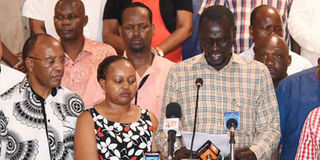Governors must strive to get it right on health this time round

Council of Governors' chairman Josphat Nanok in Mombasa on December 15, 2017 reads a statement about the election of new officials. There was no tangible outcome — at least from their statements — on how the common mwananchi is to gain from it. PHOTO | KEVIN ODIT | NATION MEDIA GROUP
What you need to know:
- What we should have heard are concrete measures to ensure industrial harmony.
- The 47 counties and the national government ought to have outlined what should happen in case of delays in disbursement of funds.
As the governors’ conference held in Kwale came to a close on Sunday, it was the usual big political talk — who has been rewarded with what, which coalition has been shortchanged and what strategy should be used for the 2022 General Election.
There was no tangible outcome — at least from their statements — on how the common mwananchi is to gain from it.
In the heat of the moment we lose focus of what really matters.
HEALTH
There will be elections in 2022, 2027 and 2032 but, in between these years, work has to be done and devolution has to be a success.
A key devolved function that has suffered a lot year in, year out in the pioneer term of county governments is health.
If it was not the doctors’ strike, then it was the nurses’ job boycott.
If not drug shortages, then it was disconnection of water or electricity supply at hospitals.
FINANCE
Women in labour have been turned away for lack of emergency care despite a presidential decree that all deliveries at public hospitals be free of charge.
Ambulances have been grounded and, quite often, in many counties patients are required to pay for fuel even when it is a referral case.
Salaries of health staff have been delayed on many occasions, a factor that has been attributed to late disbursement of funds from the National Treasury.
ACTION PLAN
It would, therefore, have been more logical for national and county government leaders who attended the conference to go beyond the usual, overused formal call for unity and partnership between the two levels of government.
What we should have heard are concrete measures to ensure industrial harmony and that never again shall we see a 150-day strike in a critical sector such as health.
On this issue, a clear plan of action for implementing the doctors’ collective bargaining agreement and the way forward in negotiating the one for nurses would have been reassuring.
HIV BURDEN
The 47 counties and the national government ought to have outlined what should happen in case of delays in disbursement of funds.
It was also important to explain how the national government would assist to ensure service delivery is not disrupted in the counties.
The youth and women would have loved to hear how they stand to benefit in a country that has one of the heaviest adolescent HIV burden with maternal deaths compounded by early and unwanted pregnancies as well as high unmet needs for contraception.
A roadmap for financing implementation of key policies in the health sector — which were formulated by the national government but remain largely unknown in counties — should have been drawn and communicated.
POLICY
With just a paltry one in 10 health institutions in Kenya offering youth-friendly services, most young people cannot access reproductive health information and services through the formal channels yet a number of policies address these issues in a very broad manner.
Kenyans would have had value for their money had the governors’ meeting came up with concrete strategies that show a joint effort in tackling some of the challenges that we have faced for years, particularly in the health sector.
Opiyo Ogaya, Nairobi.




